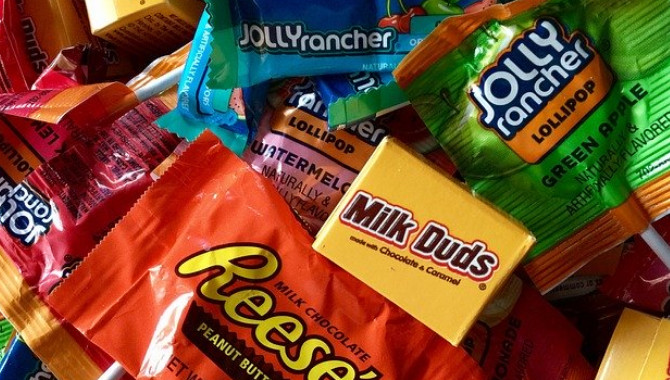Finding truly vegan confectionery can be a tricky business. When I first went vegan I was disappointed to discover that many of my favourite sweets were loaded with animal ingredients, from dairy milk in caramel and chocolate to gelatin in gummy sweets. Food dyes like cochineal and glazes like beeswax complicate things even further. Luckily, there are a few commercial brands out there that are generally considered vegan. These sweets are made without animal ingredients so you can safely enjoy them as part of your vegan diet. Having said that, even the products certified as vegan by major organisations may not be regarded as acceptable by more strict vegans.
Are Jolly Ranchers vegan? It depends on your definition. Jolly Ranchers candies do not contain gelatin, cochineal or other ingredients directly produced using animal tissue. They are certified vegan by organisations like PETA. On the other hand, they may contain things like shellac, cane sugar and additives that are not cruelty-free.
Maybe you’re a recent vegan who wants to know if your favourite candy is compatible with your new lifestyle. Maybe you’re an experienced vegan looking for something fun to try. Perhaps you’re not vegan at all but you want to get a treat for a vegan friend or family member. Whatever your situation, you’ve arrived here because you have questions about vegan confectionery.
- Are Jolly Ranchers vegan?
- What ingredients do vegans need to look out for, and are they present in Jolly Ranchers?
- Are any of the ingredients disputed?
Read on to find out more about Jolly Ranchers and other confectionery.
Are Jolly Ranchers Vegan?
According to PETA and various other groups that promote veganism and animal rights, Jolly Ranchers can be classified as vegan. This is because Jolly Ranchers candies do not contain gelatin, cochineal or other ingredients derived directly from animals. It’s reasonable to state that Jolly Ranchers contain no non-vegan ingredients. That said, these candies do contain ingredients that may be disputed. Not everything in Jolly Ranchers can be classified as completely cruelty-free.
The biggest bone of contention — to use a particularly apposite phrase — is the cane sugar used to make Jolly Ranchers. Cane sugar is often regarded as non-vegan because it is refined using bone char. This substance, produced by heating animal bones until they are completely carbonised, can hardly be said to be entirely cruelty-free. The bones used to achieve the pure white colour of refined sugar come from the meat industry, making this process anathema to many vegans. There are cane sugar sources that don’t rely on the bone char refining process but it’s unclear whether the manufacturers use these. Beet sugar, derived from a root vegetable, does not use bone char; however, beet sugar does not appear to be used in Jolly Ranchers.
Another issue is the use of artificial colouring. Among the colours, Jolly Ranchers list as used in their products are Red #40, Yellow #5, Blue #1 and Yellow #6. These are all tested on animals. Rats, mice, rabbits and even caterpillars have been used in testing these colourants. Jolly Ranchers also contain artificial flavours, which may also be tested on animals. Because Jolly Ranchers use these ingredients, which are far from cruelty-free, many vegans regard these products as unsuitable. Ingredients like this are a matter of some dispute in the vegan community. It is really down to your individual perspective and where you, personally, decide to draw the line.
Hershey’s also uses proprietary food flavouring in some of its products that are supplied by a third party. Vegans contacting Hershey’s about this have been somewhat frustrated by the lack of information on these flavourings, as Hershey’s isn’t able to state whether it’s cruelty-free or not.
These controversial ingredients aside, the majority of vegans do regard many Jolly Ranchers products as compatible with their lifestyles and ethos. Notably absent from the ingredient lists for most varieties is gelatin. Gelatin is made from animal tissues including bones, skin and tendons; it is one of the most common ingredients in confectionery, especially chews and gummy sweets. Jolly Ranchers sweets are often free from gelatin, making them more acceptable from a vegan perspective. Most lines also omit confectioner’s glaze, a common controversial ingredient that is often made with shellac (secreted by the lac beetle).
As with any large product line, care must be taken when choosing Jolly Ranchers products if you’re a vegan. Even if you accept controversial ingredients like cane sugar, some contain dairy or gelatin and are completely incompatible with a vegan diet. Later in this article, we’ll take a look at some of the product lines that are potentially acceptable to people on a vegan diet. I’ll also take a look at alternatives to Jolly Rancher that do not contain as many controversial ingredients.
Which Jolly Ranchers are safe for vegans and which are not?
With all caveats about controversial ingredients aside, there are several varieties of Jolly Rancher candy that are considered vegan by most mainstream vegan organisations. Be aware that some types may not be compatible with a plant-based diet and check the ingredients before you buy an unfamiliar variety.
The most popular variety of Jolly Ranchers, and the kind that most people probably think of when they hear the name, is the hard transparent kind. These come in a range of different fruit flavours. All of these are safe for vegans, with the usual disclaimers regarding cane sugar and food colourings. The Hershey company, which makes Jolly Ranchers, has been making moves away from artificial colours and towards natural plant-derived colours, which is good news for vegans.
Jolly Rancher lollipops are also plant-based. They contain more or less the same ingredients like the usual hard candies and are fine for most vegans.
There are a number of different flavours you can choose. Jolly Ranchers hard candies tend to contain the same ingredients with only the colours and flavourings changed. For example, a Sour Apple sweet will have the same ingredients as a Watermelon sweet, with slightly different flavourings and green versus pink food dyes.
As well as the familiar hard candies, Hershey’s also makes soft candies under the Jolly Rancher name. Some of these are also vegan, while some aren’t. Jolly Rancher jelly beans, unusually, are made without gelatin or confectioner’s glaze (a common non-vegan substance that is usually made with shellac, beeswax and other animal ingredients). Jelly bean fans on vegan diets take note.
Other soft chewy sweets sold under the Jolly Rancher name include Jolly Rancher Bites. These are soft fruit-flavoured sweets that may be solid or filled with liquid. Unfortunately, the ingredient lists vary significantly between different types of Jolly Rancher Bites. Some of the ingredients used are not vegan. They contain gelatin and other animal-derived ingredients.
Jolly Rancher Chews, Jolly Rancher Misfits and Jolly Rancher Gummies may also contain gelatin and you should avoid these. Another Jolly Rancher product that contains gelatin is Jolly Rancher Crunch ‘N Chew. Leave these on the shelves and look for something that doesn’t contain boiled skin and hooves.
What are some alternatives to Jolly Ranchers?
If Jolly Ranchers aren’t compatible with your personal brand of veganism, there are other plant-based and cruelty-free candies you could try.
If you’re concerned about the cruelty-free status of artificial ingredients, you can cut that Gordian knot by avoiding those fake flavours and chemical colours altogether. Check out organic food manufacturers’ confectionery sections to find some delicious hard candies that are both plant-based and cruelty-free. GoOrganic, for instance, makes fruit-flavoured hard candies that are very similar to Jolly Ranchers but significantly more ethical. They eschew the problematic refined sugar in favour of organic cane juice and colour their candies with natural plant-based dyes.
If you’re looking for a soft, chewy sweet with a tart fruit flavour, a popular go-to is Airheads taffy. Airheads are plant-based candy with plenty of fruit flavour and vegan-safe ingredients. Airheads aren’t terribly healthy, as they do contain small amounts of trans fats.
If you want a lollipop rather than standard sweets, try Dum Dums. These are hard sugary pops made with fairly uncontroversial ingredients. They come in several flavours and will satisfy your sweet tooth without any artificial colours or flavours.
It’s worth checking your local speciality food stores to find out if they carry vegan hard candies; there may be smaller regional manufacturers in your area, and these are often a better bet ethically than large multinationals. In general, it’s usually best to try and get your confectionery from companies that focus on making vegan products.
Another option is to make your own hard candy at home. This is a bit tricky but can be quite rewarding. I love making my own sweets because it means I get to pick absolutely everything that goes into them: beet sugar with no bone char in its history, my own preferred natural colours and the flavours I like best.
Something to keep in mind as a vegan with a sweet tooth is that even if your candy is cruelty-free, it’s still — well, candy. Sugar just isn’t that good for you in large quantities. It’s fine to enjoy the occasional piece of confectionery as a treat but sugar just isn’t something you should eat too much of. Artificial sugar substitutes are often quite bad for you too, as well as having been tested on animals in most cases. A vegan diet is one of the healthiest things you can do for your body, so it would be a shame to undo that advantage. Look for naturally sweet treats to enjoy instead of candies, such as carrot sticks, berries and fresh or dried fruit.
Welcome to VeganClue - My name is Robert Van De Ville and together with my team we spent hundreds of hours researching the most relevant topics for Vegans and non yet Vegans. Are you looking for more information about Veganism, animal welfare, diet, health, and environmental benefits of the Vegan lifestyle? You are in the right place! Enjoy the site.

